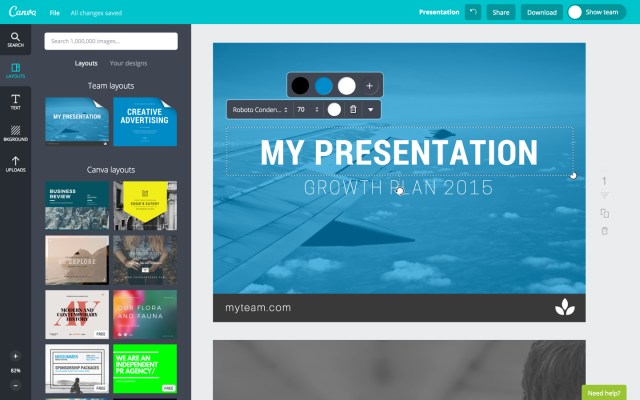For the past couple of years, Sydney-based Canva has been working to make graphic design more accessible through its online platform offering over a million photographs, graphics and fonts that can be easily dragged-and-dropped into a variety of templates. Today, the company is taking its next big step in making its service one of the standard tools in the corporate world, too.
With the introduction of Canva for Work, organizations of any size will be able to use Canva’s core feature set along with special features aimed at businesses, such as the ability to save and share a brand kit with the company’s logo and color palette, the “Team Stream” for sharing designs with others in the company to comment on or remix, and much more.
According to Canva founder and CEO Melanie Perkins, the company had fielded thousands of requests from businesses both small and large since its debut. While the platform itself had simplified graphic design for the mainstream, business users still faced a number of pain points in their organizations. For starters, their in-house graphic designers were often over-stretched, having to make minor text edits for marketing teams, executives, social media teams and others.
With Canva for Work, however, designers can instead now set up a variety of pre-made templates across varying file formats – presentations, posters, ads, letterheads, social media posts, and more. Then, others in the organization can customize these items with their own text and graphics. These materials can also be shared in a folder on Canva for easy access.
Another feature that particularly appeals to social media marketers is Canva’s “Magic Resize” option, which lets a user automatically update a design they’ve created for any of the top social networks, like Facebook, Twitter, Instagram or Pinterest, for example. With a click of a button, marketers can save themselves what would have otherwise been hours of work – something that has made this feature one of the more popular options.
Canva’s ease-of-use and its business-focused feature set, developed over the past year while the product has been in testing, has prompted a surge in user growth for the freemium platform. In April, Canva had 2 million users, but as of Friday, it had reached 4 million. To date, these users have created 30 million designs on the platform. Over 4 million designs were created just last month.
Today, there are over 5,800 layouts available in Canva, almost 1 million of which have been purchased.
[gallery ids="1193124,1193125,1193123,1193122,1193121"]
The growth is not only due to the product’s feature set or user experience, but also because it’s arriving at a time when there’s growing demand for more visual content, the CEO believes.
“We’re really seeing this trend toward visuals across every single industry and every profession,” says Perkins. “Previously, a sales letter could be plain text…but now, all of sudden, someone in sales is expected to create a beautiful visually based, custom pitch deck. That trend is absolutely universal. We think documents that, in days gone by, were text-based, are becoming increasingly visual,” Perkins adds.
To date, the business has monetized by working with external designers and photographers who seed its network with images that users can purchase for a small fee – as low as a dollar, for instance. The reason it’s able to undercut some traditional stock photography sites is because it introduced a new licensing type – a one-time license that lets you use an image in a single document. This brings the cost of the license down. Despite the lower price, Perkins says that some of its designers and photographers are making several thousand dollars per month by sharing their images on Canva.
The company isn’t sharing how much revenue it’s generating at this point, however.
But now, Canva for Work introduces another aspect to Canva’s business model. At a price point of $9.95 per user per month (on an annual subscription) or $12.95 per user if paying monthly, the service is affordable enough to be used by one-person shops or small startups, as well as larger teams.
The business platform has been in testing for several months with a number of organizations, including Huffington Post, Upworthy, Lonely Planet, Hubspot, Yelp and others. Teams here at TechCrunch have tested it, too, and are fairly pleased with the results. Businesses using the platform are being offered free, two-month trials before having to pay – an offer that’s now rolling out to Canva’s wider user base starting today and continuing over the next couple of weeks.
Also arriving in the near future is an “experts” program, which will connect Canva users with design professionals and agencies who will work with Canva platform users on their projects.
Canva is backed by $12.6 million in seed through Series A funding, with its most recent round of $6 million having closed earlier this spring.
